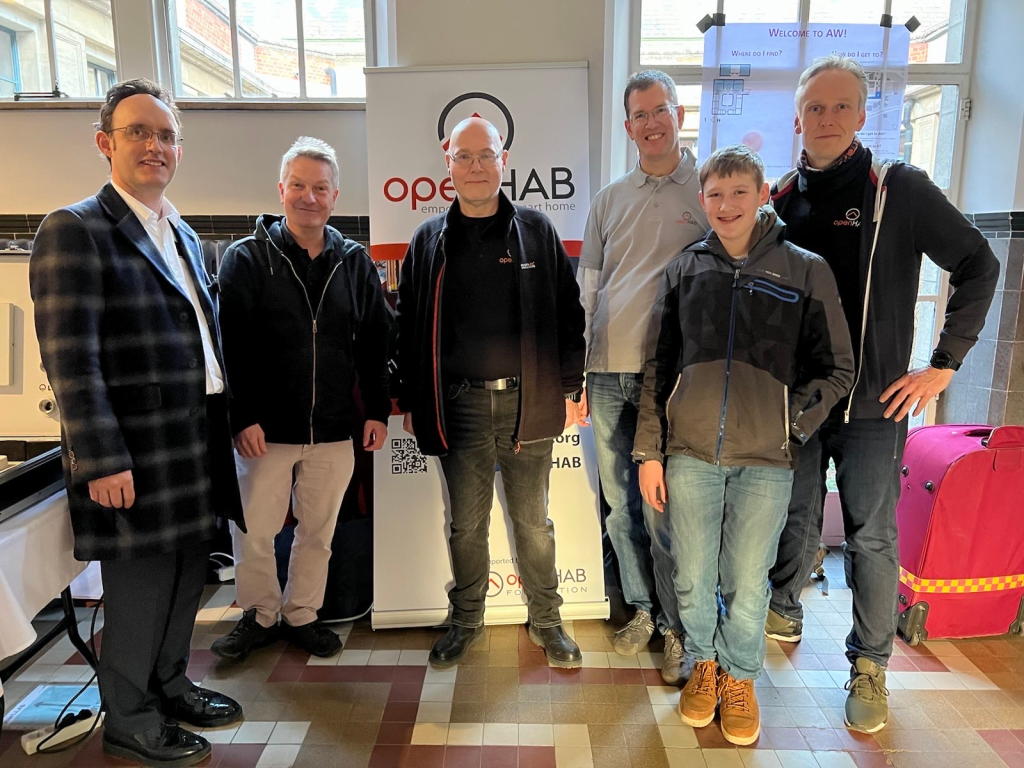FOSDEM 2023 is over. It was a blast.
Thanks to the engagement of the openHAB Foundation, the openHAB booth at FOSDEM could be fixed. 6 users of the openHAB community decided to spend a whole weekend in Brussels to explain openHAB to the visitors of the booth. From 10:00 am to 6:00 pm we had around 350 conversations about openHAB at the booth.
# 50% of conversations
Personally, I was impressed that almost half of my conversations started with “I’m thinking about getting started with smart home, but I’m a complete newbie.” Hey, it’s 2023, what have you been doing with your digital life for the past few years? But good. That was one of our missions. To get new users excited about openHAB. For this reason, I wrote a post on this topic (opens new window) a few years ago.
# 25% of conversations
Almost a quarter of all conversations started with “I’m here to say thank you. Thank you for all the contributions you’ve made.” For me, I was in the role of an openHAB booth host - I am not a developer, it was nice, but I have to pass the “thank you’s” to you - to the openHAB community for doing the job that users thank you for.
Thank YOU community for the great work!
# Hot topic
We should support the smart energy sector more. Much of the conversation centered around solar, electric mobility, and heat pumps. If you have no idea why this is so important, check out Kai’s talk at FOSDEM (opens new window).

# The last quarter of conversations
It started with “I am a Home Assistant user. Why should I switch to openHAB?” My answer was, “If you are happy with Home Assistant, there is no reason to switch.” So my personal mission was to get a better understanding of the differences between openHAB, Home Assistant, FHEM, Domoticz, ioBroker … And to be honest: I have no idea.
# To give some context
My personal experience with free/open source communities comes from content management systems (CMS). In 2013, we created the umbrella organization for the most active free and open source CMSs called CMS Garden (opens new window), where we try to understand what the best CMS is. In short, there is no best one. There are some that are a possible answer to the questions of potential users. But not THE BEST. My work as a chairman in CMS Garden has enabled me to grasp the needs of potential users and match them with the features and self-image of different CMS like Joomla, TYPO3, WordPress, Drupal, Contao, NEOS, Plone …
For me, that’s what’s missing in the Smarthome niche. I have no clue (other than the biased “SmartHome = openHAB”) to choose from the various communities which is the “best” smart home solution for THIS user.
Do YOU know the answer?
# FOSDEM booth 2024
My wish and at the same time my invitation for a joined #FOSDEM booth 2024: Hello Home Assistant, hello FHEM, hello Domoticz, hello ioBroker - we should get together to better understand how our solutions differ. We are all on the same side (the good side). We are free, libre & open source. We work formally and informally on the same issues (to open closed protocols and products). We support almost the same number of protocols and vendors. We have growing communities. AND we are not competitors!
If you are interested in collaborating on this topic, contact me in the openHAB forum (opens new window) or, if you feel more comfortable in a "neutral place", send me an email (opens new window).
So let’s improve the world together.
BTW. in my opinion, joining forces produces a better matrix than what ChatGPT can do 😃
# Let's ask ChatGPT (what it thinks it knows about FLOSS smart home systems)
Compare openHAB, Home Assistant, Domoticz, ioBroker and FHEM and tabulate the advantages and disadvantages
| Platform | Advantages | Disadvantages |
|---|---|---|
| openHAB | 1. Large community and support. 2. High level of customization. 3. Integrates with many devices and protocols. | 1. Steep learning curve. 2. Can be resource-intensive for larger systems. |
| Home Assistant | 1. Easy to set up and use. 2. Regular updates and new features. 3. Large community and support. | 1. Limited customization options compared to other platforms. 2. May require additional hardware to run smoothly. |
| Domoticz | 1. Easy to set up and use. 2. Large community and support. 3. Integrates with many devices and protocols. | 1. Limited customization options. 2. Can be resource-intensive for larger systems. |
| ioBroker | 1. High level of customization. 2. Integrates with many devices and protocols. 3. Scalable for larger systems. | 1. Steep learning curve. 2. Limited community support compared to other platforms. |
| FHEM | 1. High level of customization. 2. Integrates with many devices and protocols. 3. Scalable for larger systems. | 1. Steep learning curve. 2. Limited community support compared to other platforms. |
Note: The above table is based on the commonly observed advantages and disadvantages of the platforms and may vary based on individual experiences.